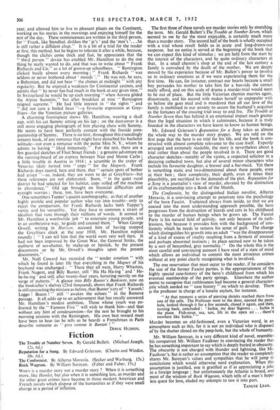Fiction
WHEN is a murder story not a murder story ? When it is something more, like Hamlet, but also when it is something less, as murder and the other great crimes have become in those modern American and French novels which dispose of the humanities as if they were small change in a period of inflation. The first three of these novels are murder stories only bystretching the term. Mr. Gerald Bullett's The Trouble at Number Seven, which seemed to me by far the most enjoyable, is certainly much more than a murder story. The second half of the book is wholly occupied with a trial whose result holds us in acute and long-drawn-out suspense, but no notice is served at the beginning of the book that we can expect this kind of stimulus ; we are held from the start by the interest of the characters, and by quite ordinary characters at that. In a small chemist's shop at the end of the last century a family is convulsed by the death of the mother. We are deeply moved by the experience because of Mr. Bullett's power to involve us in ordinary emotions as if we were experiencing them for the first time. He can, for instance, contract our hearts because a small boy persuades his mother to take him for a bus-ride she cannot really afford, and on this scale of drama a murder-trial would seem to be out of place. But the little Victorian chemist marries again, disastrously, and his second wife makes herself so unpopular with us before she goes mad and is murdered that all our love of the family is mobilised in our anxiety to secure the husband's acquittal as the fortunes of the ensuing trial sway to and fro. The Trouble at Number Seven thus has behind it an emotional impact much greater than the legal situation in which it culminates, because it is truly founded in the characters we have learnt to know as human beings.
Mr. Edward Grierson's .gepuration for a Song takes us almost the whole way to the murder story proper. We are told on the first page that the hero is on trial for his life, and the book is con- structed with almost complete relevance to the case itself. Expertly arranged and extremely readable, the story is nevertheless about a trial rather than about the people involved in it. There are good character sketches—notably of the victim, a respected solicitor in a decaying cathedral town, but also of several minor characters who include his favourite daughter, a brewer and a bar-maid. Yet there is something static and two-dimensional about these people, even at their best ; their complexity, their depth, even at times their plausibility, are sacrificed to the demands of the plot. Reputation for a Song is a journalist's view of murder, elevated by the distinction of its craftsmanship into a Book of the Month.
The Conformist, by the distinguished Italian novelist, Alberto Moravia, is a convincing attempt to penetrate into the psychology of the born Fascist. Explained always from inside, so that we are coaxed into the most understanding approach possible, the hero progresses from the destruction of lizards and cats in his childhood to the murder of human beings when he grows up. The Fascist Party is his natural field of activity, not only because of its ruth- lessness, but because it provides him with the background of con- formity which he needs to remove his sense of guilt. The change which distinguishes his growth into an adult "was the disappearance of a kind of excess of vitality resulting from a ferment of unusual and perhaps abnormal instincts ; its place seemed now to be taken by a sort of benumbed, grey normality." On the whole this is the most careful and convincing account I have read of a state of mind which allows an individual to commit the most atrocious crimes without at any point clearly recognising what is involved.
The one reservation that must occur to the reader, if he considers the size of the former Fascist parties, is the appropriateness of the highly special case-history of the hero's childhood from which his eventual membership of the party springs. Elsewhere the•author seems to recognise that ruthlessness had become a general character- istic which needed no " case history " on which to develop. There is the professor in charge of a lunatic asylum, for instance.
" At that moment a series of piercing shrieks reached them from one of the cells. The Professor went to the door, opened the peep- hole, looked through it for a few seconds, closed it again, and then, turning back, concluded : Ischia, my dear Signora . .. Ischia is the place. Fish-soup, sea, sun, life in the open air ... there's , nowhere like Ischia.' " Murder becomes an old-fashioned, even a Victorian word, in an atmosphere such as this, for it is not an individual who is disposed of by the shutter closed on the peep-hole, but the whole of humanity.
Mr. William Saroyan, in a very different kind of novel, resembles his compatriot Mr. William Faulkner in convincing the reader that he has something important to say which is deeply buried in obscurity. The obscurity is not charged with thunder and lightning, like Mr. Faulkner's, but is rather an assumption that the reader so completely shares Mr. Saroyan's values and sympathies ,that he will jump to conclusions which would otherwise need explanation. When this assumption is justified, one is gratified as if at appreciating a joke in a foreign language ; but unfortunately the Atlantic is broad, and most of the wisdom of Rock Wagram, which tells of a man's hope- less quest for love, eluded my attempts to tow it into port.
TANGYE LEAN.


































 Previous page
Previous page